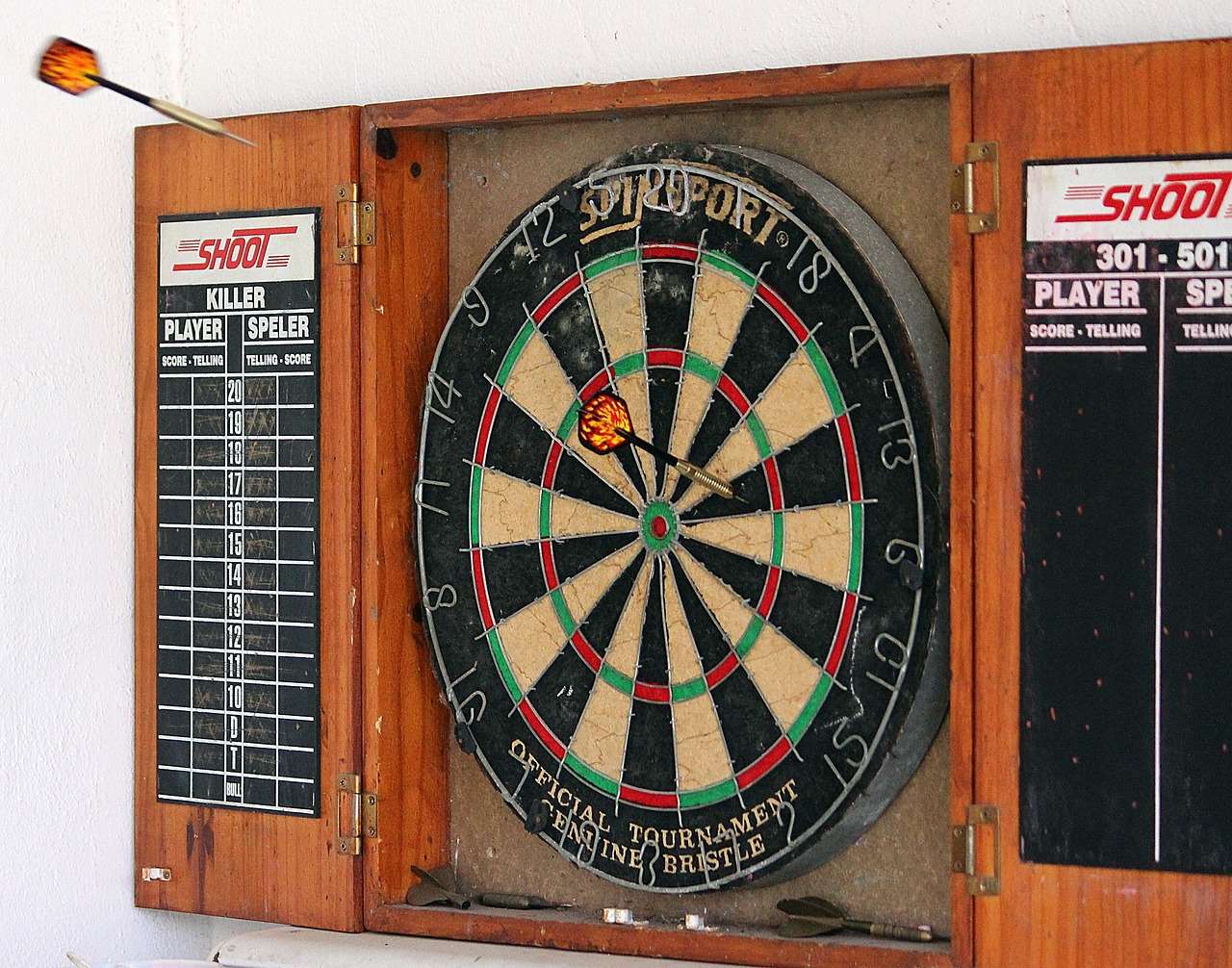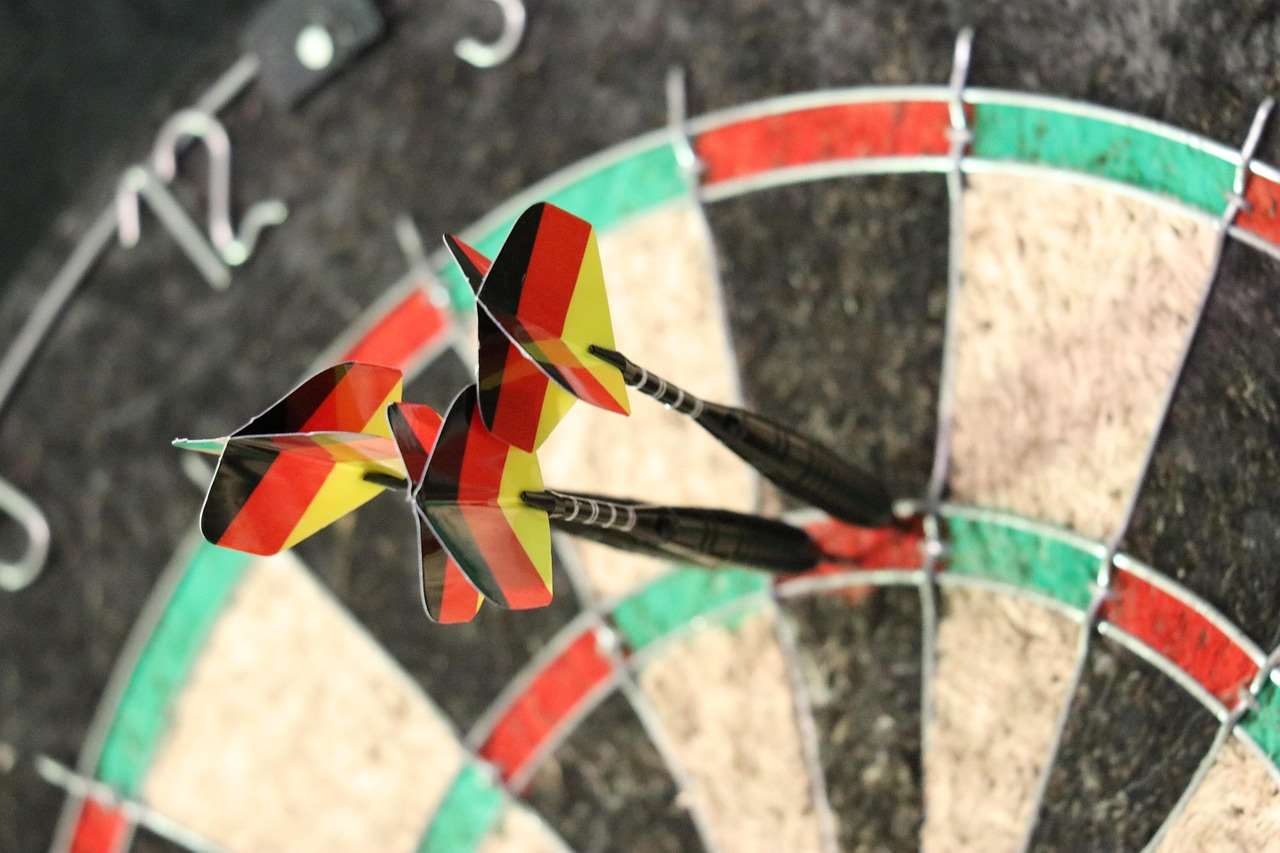Essentially, **how darts arbitrage works explained** revolves around exploiting differing odds for the same dart match across various bookmakers to guarantee a profit regardless of the outcome. This article will delve into the mechanics of this strategy, highlighting its potential benefits, inherent risks, and offering practical tips for successful implementation.
⚠️ Still Using Pen & Paper (or a Chalkboard)?! ⚠️
Step into the future! The Dart Counter App handles all the scoring, suggests checkouts, and tracks your stats automatically. It's easier than you think!
Try the Smart Dart Counter App FREE!Ready for an upgrade? Click above!
Understanding Darts Arbitrage
Arbitrage, in its simplest form, involves simultaneously buying and selling an asset in different markets to profit from price discrepancies. In the context of darts, this means finding situations where different bookmakers offer odds that, when combined, create a guaranteed return regardless of which player wins. This is often referred to as a “sure bet.” The core principle behind darts arbitrage is identifying and capitalizing on these differences in odds offered by different betting platforms.
For example, Bookmaker A might offer odds of 2.10 for Player X to win, while Bookmaker B offers odds of 2.00 for Player Y to win. If you bet appropriately on both outcomes, you can secure a profit. Calculating the correct stake is crucial, as we’ll discuss later.

Why Do Darts Arbitrage Opportunities Exist?
Several factors contribute to the existence of arbitrage opportunities in darts betting:
- Different Bookmaker Opinions: Bookmakers have their own algorithms and risk management strategies, leading to varying odds.
- Delayed Information: Odds may not always be updated simultaneously across all platforms, creating temporary discrepancies.
- Promotional Offers: Some bookmakers offer enhanced odds or special promotions that can create arbitrage situations.
How Darts Arbitrage Works Explained: A Step-by-Step Guide
Now let’s break down the process of **how darts arbitrage works explained** into actionable steps:
- Identify Potential Matches: Look for darts matches with relatively balanced odds. This increases the likelihood of finding discrepancies. Consider using resources like Player Statistics For Darts Betting to aid in your pre-match analysis.
- Compare Odds Across Bookmakers: Use online odds comparison sites or manually check multiple bookmakers for the same match. Pay close attention to decimal odds, as they simplify calculations.
- Calculate Arbitrage Opportunity: Use an arbitrage calculator (available online) or manually calculate the implied probability of each outcome. If the combined implied probability is less than 100%, an arbitrage opportunity exists. The formula is: (1 / Odds for Outcome 1) + (1 / Odds for Outcome 2) < 1. For example: (1/2.1) + (1/2.0) = 0.476 + 0.5 = 0.976. Since 0.976 is less than 1, there's an arbitrage opportunity.
- Calculate Stake Amounts: Determine the optimal stake for each outcome to maximize profit. The formula for each stake is: (Total Stake / Odds for that Outcome) / Combined Implied Probability. For the example above, if you wanted to stake a total of £100, the calculation would be: Stake for Player X = (100 / 2.1) / 0.976 = £48.87. Stake for Player Y = (100 / 2.0) / 0.976 = £51.23.
- Place Your Bets: Act quickly to place your bets on both outcomes before the odds change.
- Secure Your Profit: Regardless of which player wins, you will make a small profit. In the example above, the profit would be approximately £2.4 (£100 – £48.87 – £51.23)
Tools and Resources for Darts Arbitrage
Several online tools and resources can help streamline the darts arbitrage process:
- Odds Comparison Sites: These sites aggregate odds from multiple bookmakers in one place.
- Arbitrage Calculators: These tools automatically calculate the implied probability and optimal stake amounts.
- Betting Exchanges: While less common in darts, exchanges can sometimes offer better odds than traditional bookmakers.
- Darts Statistics Websites: Sites which offer information like Dart Player Performance Analysis can help you identify matches where there are likely to be odds differences, leading to arbitrage possibilities.
Risks and Challenges of Darts Arbitrage
While darts arbitrage can be profitable, it’s essential to be aware of the risks involved:
- Odds Fluctuations: Odds can change rapidly, eliminating arbitrage opportunities.
- Bookmaker Limits: Bookmakers may limit your stakes if they suspect you’re engaging in arbitrage.
- Voided Bets: Bets can be voided due to technical errors or rule violations.
- Commission and Fees: Betting exchanges charge commissions, which can reduce your profit. Bookmakers may also charge deposit or withdrawal fees.
- Time Constraints: Arbitrage opportunities are often short-lived, requiring quick decision-making.
- Mistakes: Incorrect stake calculations or misplacing bets can lead to losses.

Strategies for Minimizing Risks in Darts Arbitrage
To mitigate the risks associated with darts arbitrage, consider the following strategies:
- Use Multiple Bookmaker Accounts: This allows you to access a wider range of odds and avoid stake limitations.
- Act Quickly: Place your bets as soon as you identify an arbitrage opportunity.
- Double-Check Your Calculations: Ensure your stake calculations are accurate.
- Start with Small Stakes: Begin with small stakes to gain experience and minimize potential losses.
- Stay Informed: Keep up-to-date with the latest darts news and odds changes.
- Understand Bookmaker Rules: Familiarize yourself with the rules and regulations of each bookmaker you use.
- Manage Your Bankroll: Only risk a small percentage of your bankroll on each arbitrage opportunity.
Advanced Darts Arbitrage Techniques
Beyond the basic principles, some advanced techniques can enhance your darts arbitrage strategy:
- Hedging: Hedging involves placing additional bets to reduce risk if the odds change unexpectedly.
- Dutching: Dutching involves placing bets on multiple outcomes to achieve a desired profit, even if arbitrage isn’t present.
- Using Betting Exchanges: As mentioned earlier, leverage betting exchanges to potentially secure better odds than traditional bookmakers.
- Focusing on Specific Events: Concentrate on major darts tournaments or leagues to identify more arbitrage opportunities. For example, you can look at Darts Betting And Fantasy Leagues Guide for tips on where to find these opportunities.

Example of Darts Arbitrage in Action
Let’s illustrate **how darts arbitrage works explained** with a practical example:
Suppose you’re following a match between Player A and Player B. Bookmaker X offers odds of 2.20 for Player A to win, while Bookmaker Y offers odds of 1.90 for Player B to win.
1. Calculate Implied Probability: (1/2.20) + (1/1.90) = 0.455 + 0.526 = 0.981. Since 0.981 is less than 1, an arbitrage opportunity exists.
2. Calculate Stake Amounts: If you want to stake a total of £100:
- Stake for Player A: (100 / 2.20) / 0.981 = £46.24
- Stake for Player B: (100 / 1.90) / 0.981 = £53.62
3. Place Your Bets: Place £46.24 on Player A to win at Bookmaker X and £53.62 on Player B to win at Bookmaker Y.
4. Secure Your Profit: Regardless of who wins, your profit will be approximately £1.4 ( £100 – £46.24 – £53.62)
Tracking Your Results and Performance
Successful darts arbitrage requires careful tracking of your results and performance. Keep a detailed record of each arbitrage opportunity, including the match, bookmakers used, odds, stake amounts, and profit or loss. This data will help you identify trends, refine your strategy, and improve your overall profitability. Consider using a spreadsheet or specialized betting tracker to manage your records efficiently.

The Importance of Speed and Accuracy
In the fast-paced world of darts arbitrage, speed and accuracy are paramount. Odds can change rapidly, and arbitrage opportunities can disappear in a matter of seconds. Therefore, it’s crucial to have a reliable system for identifying arbitrage opportunities, calculating stake amounts, and placing bets quickly and accurately. Practice using arbitrage calculators and odds comparison sites to improve your efficiency. Familiarize yourself with resources explaining How To Analyze Dart Player Form to improve your pre-match preparation.
Staying Updated with the Latest Darts News
Keeping abreast of the latest darts news is essential for successful arbitrage. Player injuries, form fluctuations, and other factors can significantly impact odds and create new arbitrage opportunities. Stay informed by following reputable darts news sources, social media accounts, and online forums. This will help you anticipate odds changes and make informed betting decisions.

Conclusion: Is Darts Arbitrage Right for You?
Understanding **how darts arbitrage works explained** reveals both its potential and its inherent challenges. While it offers the possibility of guaranteed profits, it requires dedication, discipline, and a willingness to learn and adapt. It is not a get-rich-quick scheme, but a strategic approach to betting that demands careful planning, meticulous execution, and constant monitoring. If you’re prepared to invest the time and effort, darts arbitrage can be a rewarding endeavor. Remember to gamble responsibly and only risk what you can afford to lose. Start small, learn the ropes, and gradually increase your stakes as you gain experience and confidence. Consider exploring other betting strategies like analyzing 180s Per Leg Stats For Betting to supplement your approach. Ready to explore more strategies? Check out our detailed guides on darts betting to enhance your knowledge and skills!
Hi, I’m Dieter, and I created Dartcounter (Dartcounterapp.com). My motivation wasn’t being a darts expert – quite the opposite! When I first started playing, I loved the game but found keeping accurate scores and tracking stats difficult and distracting.
I figured I couldn’t be the only one struggling with this. So, I decided to build a solution: an easy-to-use application that everyone, no matter their experience level, could use to manage scoring effortlessly.
My goal for Dartcounter was simple: let the app handle the numbers – the scoring, the averages, the stats, even checkout suggestions – so players could focus purely on their throw and enjoying the game. It began as a way to solve my own beginner’s problem, and I’m thrilled it has grown into a helpful tool for the wider darts community.